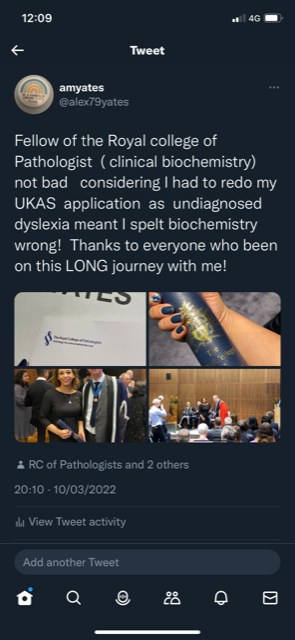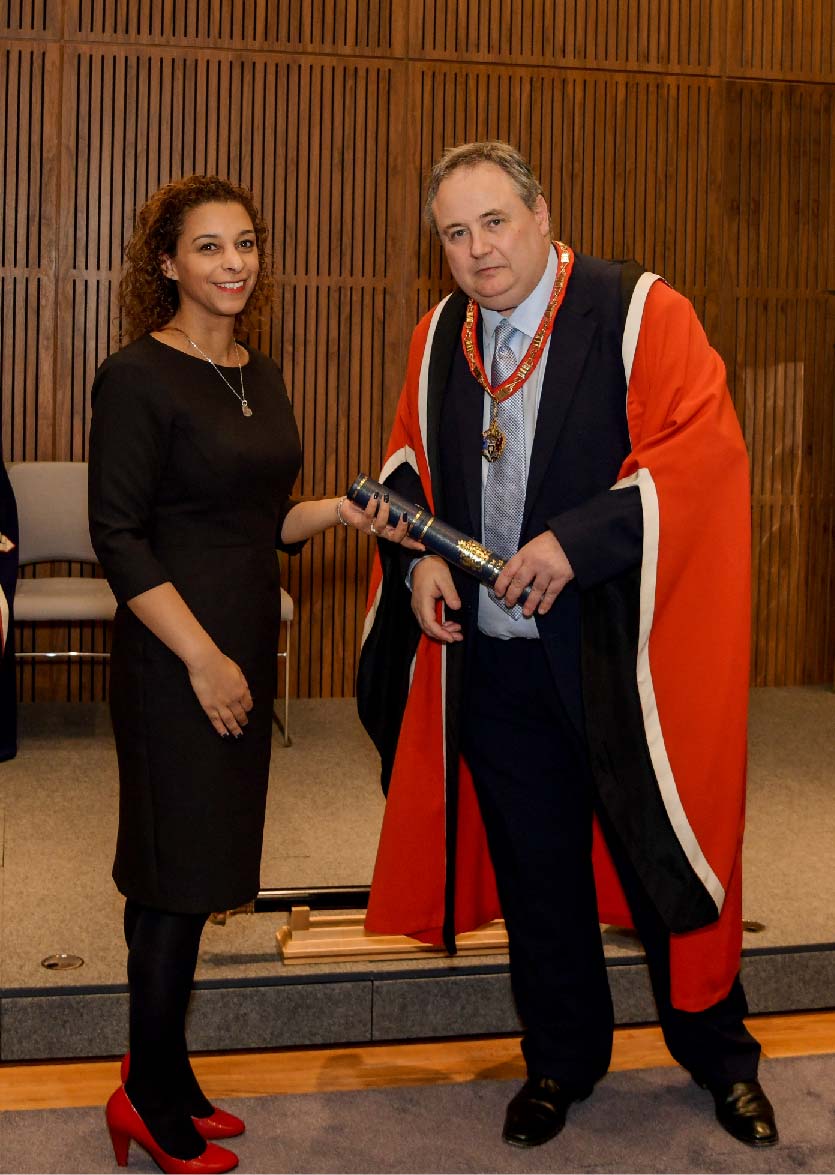In February 2022, after receiving my FRCPath at the Royal College of Pathologists, I decided to put out a tweet celebrating my achievement.

Obtaining Fellowship is a huge achievement for all College members and something we should all be proud of. I, however, was motivated to put the tweet out as there was a time when I really didn’t think it was an obtainable goal.
I also wanted to shine a spotlight on the need to acknowledge the different abilities of members of the profession and the hurdles they have faced on their professional journey.
I had progressed through the examinations and practical part of the clinical biochemistry exam relatively quickly. After a few false starts at the practical work, I completed the practical component to my written project. I then had to write this up to the standard required by examinations board. Again, this is huge task for all of us, alongside our regular work and life, but I had my dyslexia to overcome too.
I will preface this blog by clearly stating that I'm not writing the blog for recognition, pity or any selfish means. I was invited by the College to tell my story and highlight aspects of members’ lives that we should be aware of as we all strive to be inclusive employers.
Path to diagnosis
I have always been academic but throughout my education, I was often pulled up for rushing and spelling things incorrectly. Perhaps this is why I ended up doing Maths and Sciences at A levels, as there is no requirement for huge essays or lots of reading. I got the grades required to study biochemistry and went off to university.
It was during my second-year exams, the first set of essay-based exams I had done since GCSEs, that a tutor asked for my paper to be de-anonymised as he had concerns that the level of English was not adequate for the course. To his surprise, English was my first language!
... a tutor asked for my paper to be de-anonymised as he had concerns that the level of English was not adequate for the course. To his surprise, English was my first language!
My personal tutor was extremely helpful, and the university had me formally assessed and diagnosed with dyslexia. Although my dyslexia is deemed to be a mild form, it explained a lot of things that have happened to me throughout my life so far:
- crying to my parents, aged 13, that I “just couldn’t spell”
- having to re-write my whole UCAS application as I had spelt ‘biochemistry’ in numerous different ways
- never really enjoying reading
- performing better in short answer or multiple choice exams than essay-based exams
- sending out emails, letters, tweets (see above!) with spelling mistakes in them
- never knowing my left from my right
- my love of bullet points and lists.
Once diagnosed and while in higher education, both for my BSc and MSc, I was given extra time in all my subsequent exams. This has three benefits:
- I was in a smaller less distracting room
- I didn’t feel rushed, which meant that my written language was so much better
- I could also use my extra time to proofread my work. I could reword any sentence that had made sense to me in the adrenaline-fueled answering of exam questions, but actually made no sense.
Examiners were also made aware of it and, hence, were more lenient on spelling and grammar mistakes in essays and dissertations.

Tips and issues when working with dyslexia
Dyslexia has never stopped me achieving anything but knowing I have it has helped me put into place mechanisms for everyday occurrences.
- I always have an independent person check over any important job applications or documents.
- I openly ask colleagues and team members not to worry about correcting my spelling, grammar or phrasing, and I’m not offended when a document comes back full of track changes.
- If reading large papers, I will print them on tinted paper and change the font to Arial if possible. I realised recently that reading documents in Arial font is easier, especially on a screen.
- I will use the ‘speak selected text’ function found on most Microsoft software (another recent discovery).
However, it would be remiss of me to not point out some of the problems dyslexia still causes me.
- My laboratory’s current Laboratory Information Management System (LIMS, which allows you to manage samples and keep track of data) does not spell check. I often spot spelling mistakes when reviewing the patients later.
- I have received judgemental comments from people on my misuse of ‘there/ their’ and other such homophones as well as spelling mistakes.
- I knew I would struggle with the Clinical Biochemistry Part 2 module 2 exam where you must read and review a scientific paper under time pressure.
- I put off writing long documents and take longer than most to produce documents worthy of onward circulation.
- I would be lost without spell check, understanding educational supervisors, line mangers, team members and ad-hoc proofreaders.
- I will never volunteer to take notes in any group work.
What help is available?
If you have a formal diagnosis of dyslexia, all educational intuitions should be able to accommodate required changes in examination-type settings. The British Dyslexia Association (www.bdadyslexia.org.uk) has resources for all stages of life and advice for employers.
I agreed to write this blog of my personal experience in the hope that others who read it might consider getting themselves tested as it’s never too late, as well as to highlight that there is assistance out there.
I would also like to highlight to employers that within pathology workforce there will be staff members who have dyslexia, so please take a moment to review the BDA guidance for employer pages and see how small adaptions can make a huge difference.

